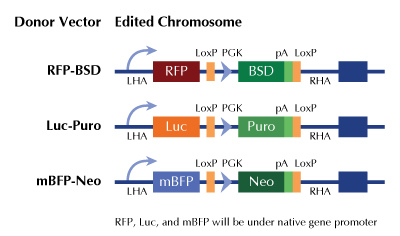STING (TMEM173) Human Gene Knockout Kit (CRISPR)
CAT#: KN208418BN
TMEM173 - human gene knockout kit via CRISPR, HDR mediated
Functional Cassette: GFP-puro Luciferase-Puro RFP-BSD
HDR-mediated knockout kit validation
USD 1,657.00
4 Weeks*
USD 450.00
USD 686.00
Specifications
| Product Data | |
| Format | 2 gRNA vectors, 1 mBFP-Neo donor, 1 scramble control |
| Donor DNA | mBFP-Neo |
| Symbol | STING |
| Locus ID | 340061 |
| Components |
KN208418G1, STING gRNA vector 1 in pCas-Guide CRISPR vector KN208418G2, STING gRNA vector 2 in pCas-Guide CRISPR vector KN208418BND, donor DNA containing left and right homologous arms and mBFP-Neo functional cassette. GE100003, scramble sequence in pCas-Guide vector |
| Disclaimer | These products are manufactured and supplied by OriGene under license from ERS. The kit is designed based on the best knowledge of CRISPR technology. The system has been functionally validated for knocking-in the cassette downstream the native promoter. The efficiency of the knock-out varies due to the nature of the biology and the complexity of the experimental process. |
| Reference Data | |
| RefSeq | NM_001301738, NM_198282, NM_001367258 |
| UniProt ID | Q86WV6 |
| Synonyms | ERIS; hMITA; hSTING; MITA; MPYS; NET23; SAVI; STING |
| Summary | This gene encodes a five transmembrane protein that functions as a major regulator of the innate immune response to viral and bacterial infections. The encoded protein is a pattern recognition receptor that detects cytosolic nucleic acids and transmits signals that activate type I interferon responses. The encoded protein has also been shown to play a role in apoptotic signaling by associating with type II major histocompatibility complex. Mutations in this gene are the cause of infantile-onset STING-associated vasculopathy. Alternate splicing results in multiple transcript variants. [provided by RefSeq, Sep 2014] |
Documents
| Product Manuals |
| FAQs |
| SDS |
Resources
Other Versions
| SKU | Description | Size | Price |
|---|---|---|---|
| KN208418 | TMEM173 - human gene knockout kit via CRISPR, HDR mediated |
USD 1,657.00 |
|
| KN208418LP | TMEM173 - human gene knockout kit via CRISPR, HDR mediated |
USD 1,657.00 |
|
| KN208418RB | TMEM173 - human gene knockout kit via CRISPR, HDR mediated |
USD 1,657.00 |
|
| KN408418 | TMEM173 - KN2.0, Human gene knockout kit via CRISPR, non-homology mediated. |
USD 1,657.00 |
|
| GA117456 | TMEM173 CRISPRa kit - CRISPR gene activation of human transmembrane protein 173 |
USD 1,657.00 |
{0} Product Review(s)
Be the first one to submit a review






























































































































































































































































 Germany
Germany
 Japan
Japan
 United Kingdom
United Kingdom
 China
China
